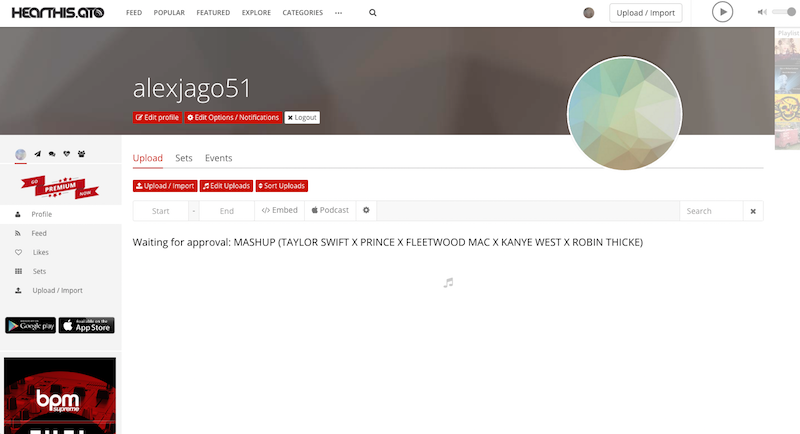DMCA Bait with randomly generated 'music'
Do some music services really scan content for infringement or do they just make a judgement call based on the metadata?
The setup
Mashup artist Pomdeter recently posted a set of screenshots to his Facebook page, describing how he uploaded a mix to the site hearthis.at with a ‘DMCA-bait’ title:
MASHUP (TAYLOR SWIFT X PRINCE X FLEETWOOD MAC X KANYE WEST X ROBIN THICKE)
Pomdeter says the track contains non of those artists, but was, in fact, “10 minutes of noise and drums”. The track may be found here. The screenshots continue to show how the track was automatically removed under the terms of the DMCA. Pomdeter draws the conclusion that the track was removed off its title alone, which flies in the face of the DMCA’s fair use provisions
The experiment
This provided a golden opportunity for experimentation. I was previously not a hearthis user, and I’ve recently modified a shell script to play ‘music’ that’s completely randomly generated (hat-tip to Robert Elder).
So I generated some random music and uploaded it, under that same title.
The production
The first step is to acquire a source of random noise. Personally, I
find /dev/urandom to work well for this. 10 kilobytes is
plenty:
head -c 10000 /dev/urandom > random_noiseThen using awk, we convert that random noise into a
series of scale notes, and from there into a series of amplitudes
representing those notes (all for a duration of about a quarter of a
second). hexdump and xxd get us from and back
to binary, which is then fed into sox to generate our
actual audio file. For a more detailed explanation, I direct you back to
Robert
Elder.
cat random_noise | hexdump -v -e '/1 "%u\n"' \
| awk '{ split("0,2,4,5,7,9,11,12",a,","); for (i = 0; i < 1; i+= 0.0001) \
printf("%08X\n", 100*sin(1382*exp((a[$1 % 8]/12)*log(2))*i)) }' \
| xxd -r -p | sox -traw -b32 -L -c2 -r16000 -e unsigned-integer - mashup1.mp3The result: a 5 minute, 12 second .MP3 file of complete musical gibberish, which you may listen to here.
The uploading
I created my hearthis.at account. Uploading itself went fine and was a smooth and pleasant experience from my new-user’s perspective. Once transcoding was done, the track was then ‘waiting for approval’:

I have no idea how long this will take.
What happened next?
Update #1
12 hours later and it’s still ‘waiting for approval’. Googling the phrase ‘waiting for approval’ returns nothing of use.
I’ve just tweeted to @HearThisAt to hopefully get a better understanding of what this is and why it’s happening. Maybe it’s just some setting in my profile that I need to toggle, maybe it’s copyright madness. Hopefully, we can find out.
Update #2
24 hours later. @HearThisAt responded to my tweet, asking if I’d received an email from them (I’ve searched for such an email and can’t find one).
Original DMCA-bait track is still ‘waiting for approval’.
I’ve just uploaded a second random-noise track, which is now live:
random music by alexjago51 on hearthis.at
Conclusions
HearThis are pretty obviously flagging tracks purely off their titles. It remains to be seen what happens to that first track, especially whether Universal puts in a spurious claim. If someone wanted to yell about trademarks, or false advertising, sure. But it’s not a copyright breach.
It will be particularly amusing if said claim does go in - a US law applied against an Australian’s upload to a German site.